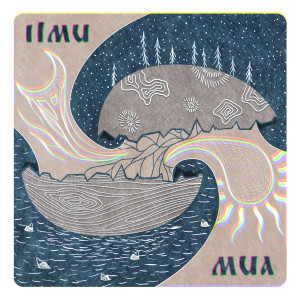 Ilmu’s sophomore album Mua is a fresh journey through the dark sounds and emotions of the North. Rooted in the Karelian Republic’s mystical cultural heritage, the band, who recently moved from Russia to Finland, weaves a tapestry of sound that speaks to the soul.
Ilmu’s sophomore album Mua is a fresh journey through the dark sounds and emotions of the North. Rooted in the Karelian Republic’s mystical cultural heritage, the band, who recently moved from Russia to Finland, weaves a tapestry of sound that speaks to the soul.
The album’s 13 tracks delve into the essence of primordial Earth, capturing the magic of nature’s dance and the raw beauty of life and death. Collaborations with artists like Saylyk Ommun and Tuomas Rounakari add depth to the sonic landscape, infusing traditional folk songs with a contemporary arrangements.
One standout track, “Kazvatti Minuu Muamoi / Teve Khaya,” breathes new life into Karelian and Tuvan folk traditions, blending intricate instrumentals with ethereal vocals sung in the Livvi-Karelian language. The meticulous attention to detail, such as recording wind instruments and crafting instruments like the Karelian horn torvi, adds layers of memorable atmosphere to the album.
The album’s creative process, described as almost dreamlike, underscores the band’s deep connection to their music and heritage. From the haunting melodies of “Syvys” to the minimalist beauty of “Sulgazet,” each track is a testament to the band’s craft.
One of the album’s highlights, “Aldo,” reinvents club dance music with psychedelic chants, inviting listeners to lose themselves in its hypnotic rhythm. Meanwhile, “Valgo” pays homage to the VALGO music festival, infusing the track with the spirit of celebration and community.
Closing out the album is “Minun iäni,” a poignant reflection on the passage of time and internal transformation. The track is a fitting finale with its evocative lyrics and haunting melody, leaving listeners eager to explore the next musical chapter of Ilmu’s journey.
I enjoyed their self-titled first full-length album more — I personally consider a musical masterpiece, and the song “Jyryn Iel” I have on my playlist on repeat. But “Mua” is a musical odyssey that transports listeners to the heart of Karelian culture and the wonders of the natural world. And the quality of the record is absolutely not inferior to indie and modern folk, made, for example, in Sweden and Finland. For me, it is an essential step for folk music from Russia now living abroad, where it can flourish.
(ILMU, 2024)
